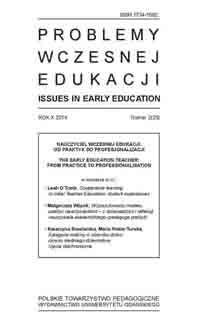Knowledge in the teaching-learning process – from meeting standards to reflecting on standards
Słowa kluczowe:
knowledge, concept of knowledge, reflectionAbstrakt
The paper concentrates on knowledge from the perspective of constructivism. We review several concepts (Dewey, Gordon, Bruner and others), with an emphasis on those for whom understanding knowledge is crucial and who focus their attention not so much on the external manifestations of student activity but on their mental significance and the processes involved. The discussion presented in the paper is of a theoretical nature, while the analysis of knowledge is not conducted from the psychological (individualized) perspective, but exposes the social consequences of education. Thus, the analysis does not deal with the mind as such, but what the school system does with students’ minds and what consequences this may have. As a result of the analysis undertaken the paper is in two parts. The first part reflects the approach of teachers to knowledge when pragmatic constructivism is the point of reference. The second presents knowledge from the learner’s perspective, as a participant in the educational process. Finally, the conclusions list the social consequences of education derived from specific (positivist/anti-positivist) concepts of knowledge.
Downloads
Bibliografia
Bauman Z. (1995), Ciało i przemoc w obliczu ponowoczesności. Toruń, UMK.
Bruner J. (2006), Kultura edukacji. Kraków, Universitas.
Bruner J.(1965), Proces kształcenia. Warszawa, PWN.
Cochran-Smith M., Lytle S.L.(1999), Relationships of knowledge and practice: teacher learning in communities. “Review of Research in Education”, 24.
Cohen D.K. (1988), Educational technology and school organization. In: R.S. Nickerson, P.P Zodhiates (eds.), Technology in education: looking toward 2020. Hillsdale, NJ, Lawrence Erlbaum Associates.
Červinkova H., Gołębniak B.D. (eds.) (2010), Badania w działaniu: pedagogika i antropologia zaangażowana. Wrocław, Wydawnictwo Naukowe DSW.
Dahlberg G., Moss P., Pence A.(1999), Beyond quality in early childhood. Education and care: postmodern perspectives. London, Falmer Press.
Dewey J. (1902/1956), The child and the curriculum. In: L. Carmichael (ed.), The child and the curriculum, the school and society. Chicago, University of Chicago Press.
Dewey J. (1988), The quest for certainty. In: J.A. Boydston (ed.), The later works, vol. 4: 1929. Carbondale, Illinois, Southern Illinois University Press.
Dylak S. (2013), Architektura wiedzy w szkole. Warszawa, Difin SA.
Ethell R.G., McMeniman M.M. (2000), Unlocking the knowledge in action of an expert practitioner. “Journal of Teacher Education”, 51(2).
Foucault M. (1998), Nadzorować i karać. Warszawa, Aletheia.
Freire P. (1970, 1994), Pedagogy of the oppressed, trans. M. Bergman Ramos, New York, Continuum.
Gołębniak B.D.(1998), Zmiany edukacji nauczycielskiej. Wiedza-biegłość-refleksyjność. Toruń- Poznań, Wydawnictwo Edytor.
Gordon M. (2009), Towards a pragmatic discourse of constructivism: Reflections on lessons from practice. “EducationalStudies”,45.
Grossman P. (2008), Responding to our critics: From crisis to opportunity in research on teacher education. “Journal of Teacher Education”, 59(1).
Hargreaves A. (2011), Foreword: an unfinnished business. In: P. Sahlberg, Finnish lessons: what can the world learn from educational change in Finland? New York, Teachers College Press.
Hmelo-Silver C.E. (2004), Problem-based learning: what and how do students learn?“Educational Psychology Review”, 16.
Kielar M. (1989), Potrzeby i możliwości poznawcze dziecka. „Wychowanie w Przedszkolu”,1.
Kincheloe J.L. (1991), Teachers as researchers: qualitative inquiry as a path to empowerment. Bristol, PA, Falmer Press.
Klus-Stańska D.(2005), Mentalne zniewolenie nauczycieli wczesnej edukacji – epizod czy prawidłowość. „Problemy Wczesnej Edukacji”, 1(1).
Klus-Stańska D. (2013), Cyfrowi tubylcy w szkole cyfrowych imigrantów, czyli awatar w świecie Ptysia i Balbinki. „Problemy Wczesnej Edukacji”, 4(23).
Korthagen F.A.J. (2010), How teacher education can make a difference. “Journal of Education for Teaching”, 36(4).
Korthagen F.A.J. (2004), In search of the essence of a good teacher: Towards a more holistic approach in teacher education. “Teaching and Teacher Education”, 20(1).
Kwaśnica R. (1994), Wprowadzenie do myślenia o wspomaganiu nauczycieli w rozwoju, Wrocław, Wrocławska Oficyna Nauczycielska.
Lampert M. (2005), Preparing teachers for ambitious instructional practice: Learning to listen and to construct an appropriate response. Paper presented at the annual meeting of the American Educational Research Association, Montreal, Canada.
Murawska B., Putkiewicz E., Dolata R. (2005), Wsparcie rozwoju zawodowego a potrzeby nauczycieli w tym zakresie. Warszawa, Instytut Spraw Publicznych.
Neisser U. (1967), Cognitive psychology. New York, Appelton Century Crofts.
Nęcka E. (1995), Proces twórczy i jego ograniczenia. Kraków, Oficyna Wydawnicza Impuls.
Piaget J. (1970), Science of education and the psychology of the child. New York, Viking Press.
Pervin L.A., John O.P. (2002), Osobowość – teoria i badania. Kraków, Wydawnictwo Uniwersytetu Jagiellońskiego.
Pirotrowski M. (2013), Od TQM do „żandarma”, czyli pod prąd. Warszawa, Wydawnictwo VEDA.
Prout A., James A. (1990), A New Paradigm for the Sociology of Childhood? In: A. James, A. Prout (eds.) Constructing and Reconstructing Childhood. Contemporary Issues in the Sociological Study of Childhood. London, Falmer Press.
Rokeach M. (1960), The open and closed mind: Investigation into nature of belief system and personality system. New York, Basic Book.
Ryan A. (2012), Integrating experiential and academic learning in teacher preparation for development education. “Irish Educational Studies”, 31(1).
Ryan A. (2005), Teacher development and educational change: Empowerment through structured reflection. “Irish Educational Studies”, 24(2–3).
Sahlberg P. (2011), Finnish lessons: what can the world learn from educational change in Finland? New York, Teachers College Press.
Schaffer H.R. (2006), Rozwój społeczny. Dzieciństwo i młodość. Kraków, Wydawnictwo Uniwersytetu Jagiellońskiego.
Schön D.A. (1983), The reflective practitioner: how professionals think in action. New York, Basic Books.
Schön D.A. (1992), The theory of inquiry: Dewey’s legacy to education. “Curriculum Inquiry”, 22(2).
Windschitl M. (1999), The challenges of sustaining a constructivist classroom culture. “Phi Delta Kappan”, 80.
Wragg E.C. (1999), Trzy wymiary programu. Warszawa, WSiP.

 Uniwersyteckie Czasopisma Naukowe
Uniwersyteckie Czasopisma Naukowe





